The Benefits of Swimming with a Child with Intellectual Disabilities
By Brenda Stuart, Special Olympics Colorado Parent
Yes, the gold medals are nice, but that’s not why we encourage our son, Jack, to swim for Special Olympics Colorado. The water has an amazing calming effect, and it can last for several hours after he gets out of the water.
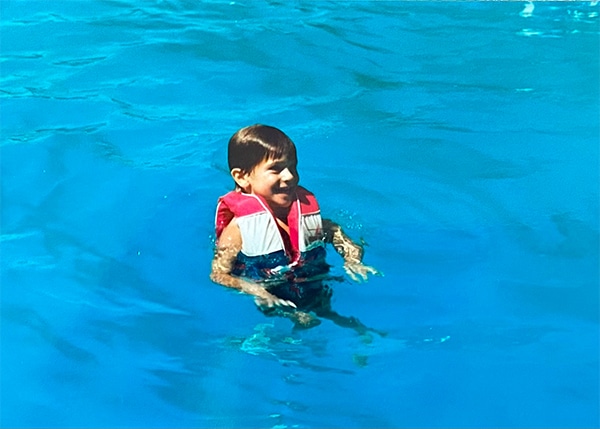
The Ultimate Sensory Stimulation
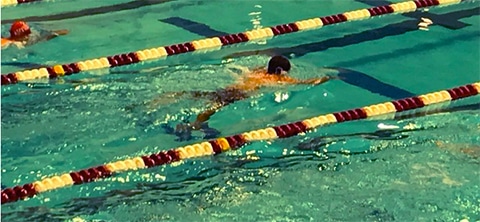
When the outside world gets overwhelming, too loud, too visually stimulating, and too crowded, the silence of being underwater offers relief. Water also offers visual and tactile stimulation and appeals to our sense of smell. Who doesn’t love the salty smell of the ocean or the chlorinated water in the pool?
It’s not surprising many specialists recommend hydrotherapy for their patients. Just half an hour in the water can improve your child’s concentration, alertness, and eye contact. Swimming, dog paddling, or just sitting in water can also cut down on self-stimulation behavior by easing anxiety.
Other "Swimpressive" Benefits
Swimming can be a team sport that you can do individually. We often see the swimmers high-five each other after getting out of the pool, but they don’t feel pressured to pay attention to the other athletes. It’s an independent sport that gives the swimmer the perks of being on a team without the pressure of letting anyone down.
Jack enjoys the weightlessness the water gives him. In a world where he struggles with clumsiness, the water gives him a sense of control and accomplishment.
The freedom of water can be even more profound for people in wheelchairs. Over the years, we’ve watched as wheelchair users gain that same confidence and mobility when swimming.
Just the act of transferring from the wheelchair to the pool is a workout. Our community pool has provided a few youngsters the motivation they need to learn how to make those transfers easier.
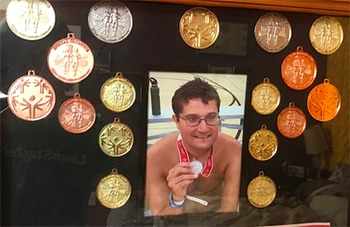
Start Slow
In my son’s case, it took a while to persuade Jack to get into the water. Now it’s tough to get him out.
How did we do it?
We began with a kiddie pool in the backyard and gradually increased the size of it so that Jack would be comfortable in the water. We also encouraged him to play with the hose and sang songs such as “Under the Sea” from “The Little Mermaid.”
When it came to the community pool, we started by teaching him to get comfortable wearing a life jacket and water wings. As his skills improved, we were able to ditch the supports.
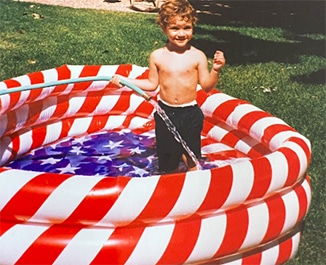
Water and Other Backyard Hazards
Water is alluring – but dangerous. Swimming Lessons lessen the risk of accidental drownings or injuries. Don’t expect any child to put their face into the water right away, let alone a child with intellectual disabilities.
There is also a danger of your child feeling too comfortable in the water. NEVER leave your child alone near even the smallest pool. Leave your phone and any other distractions inside the car or your house so you can devote100% of your attention to him or her because you are your child’s lifeguard.
Keep in mind: Water isn’t the only hazard in your backyard. We learned the hard way about the bugs lurking near the pool… especially the wasps and bees.
The solution? An all-natural and organic pest control that wouldn’t hurt him or the beneficial bugs pollinating our garden.
But stay away from vinegar. While it kills the weeds and deters the bugs in your yard, the pungent smell also deters children with intellectual disabilities with sensory issues.
Dive Into More Water Activities
Swimming opens the door to a whole pool of new activities for your child.
Once Jack learned to enjoy swimming, he became interested in scuba diving and playing with dolphins.
Becoming certified to scuba dive was a bit of a challenge, but he was determined to dive in and learn the safety rules. Yes, we taught him how to swim, but he’s teaching us there’s a whole new world under the sea.
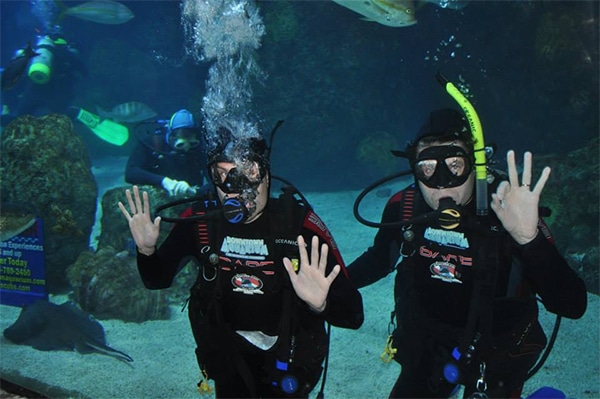

Brenda Stuart is a Denver journalist and frequent volunteer with Special Olympics Colorado. Her son’s favorite activities are swimming, basketball, and special events like Tip-a-Cop and the Polar Plunge.